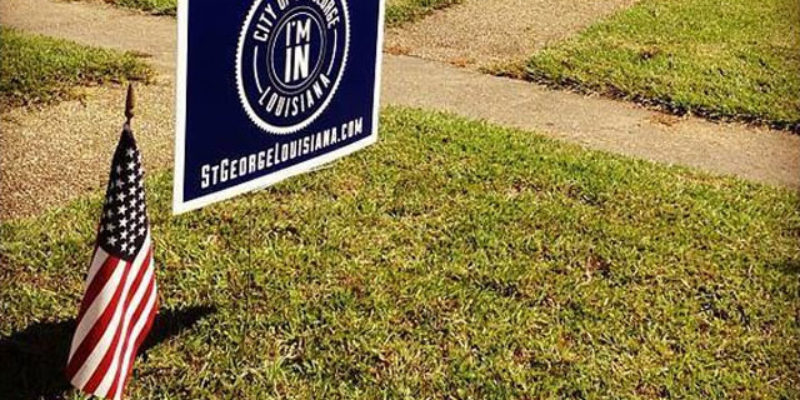In the wake of the close-but-no-cigar effort to incorporate the city of St. George in East Baton Rouge Parish, the silver lining to an outcome that smothered democratic impulses and the exercise of liberty should be to reform a process that instead strengthens these.
Witnessing this process play out as by statute revealed that the law needlessly suppresses people’s abilities to choose their own form of government, weighing matters far too heavily in favor of opposition that, in the case of St. George, represented in large part greedy self-interest of some elements in the city of Baton Rouge. This effort highlighted several changes that should occur to these laws.
There are some general matters necessitating change, as noted previously. The open-ended nature of the process leave too much uncertainty, where currently a petition is gathered over any length of time and temporal constraints don’t begin until this is turned in officially. Over the passage of too much time, geographic and demographic conditions can change too much, distorting actual popular will. Thus, the procedure should have a notice of intent first filed, where the parish registrar in 30 days ascertains the exact number of registered voters in the specified geographic area. Then, the organizers have nine months to collect signatures, the registrar 30 days to check them, and then a final 30 days for organizers to collect the number short, if any. If it all checks out, the question goes to the ballot at the next regularly scheduled election if completed prior to the deadline to submit a ballot proposition; if not, then on the ballot of the one after that.
Other matters should be implemented to redress the imbalance in favor of opposition, although one of these also should apply to organizers as well. Current state law regulates no aspect of the finances involved. This should fall under campaign finance law, where it would be illegal to spend on materials and venues for gathering signatures or to promote that as well as any on materials or meetings to oppose without reporting of donations and expenditures, including non-pecuniary ones, as is required for ballot propositions. By all appearances, the opposition to the St. George effort spent huge sums, possibly much from outside the immediate area from unknown sources in the shadows, but the interests involved and their extent of involvement never will be known, delivering a slap in the face of good government. While organizers largely were homegrown and used local resources, what’s sauce for the goose is sauce for the gander and transparency would have been served by having their financial details made public information as well.
But the signature withdrawal procedure as it stands gives a clear, unjustifiable advantage to opponents. During the signature verification process they may submit withdrawal forms while the supporters cannot add any signatures. A case could be made for this under the current format that has no time boundaries save the 60 days to collect more signatures after verification, but under standards outlined above this is not necessary; thus, signature removals would occur only during periods of signature collection. And, to maximize choice for the wishy-washy, withdrawals of signature withdrawals ought to be permitted.
Also as previously noted, opponents by present statute have no impediments in cajoling nearby incorporated areas to annex land of the proposed region as a defensive strategy that subverts the entire extant process. Whenever an intent to incorporate gets filed, any annexation in the proposed area must be forbidden until supporters either do not get enough signatures after a year at most or, if they did, the measure fails at the ballot box. Under present law, at this point two years must pass before another petition can come forth, but that should be curtailed to one year after certification of a failed election’s results or the failure to obtain enough valid signatures, which would give plenty of time for deciding on the wisdom of annexation and to make efforts to get a majority of residents and owners representing at least a quarter of the value of the property to assent, as by law.
Finally, the 25 percent of registered voter signatures requirement is far too burdensome to trigger an election. Some states are worse, such as Arkansas which requires half plus one of the registered voters in an area to petition. But others are more reasonable, like in Texas where for a city as large as a proposed St. George only 10 percent of voters must petition. The experience of the St. George effort should demonstrate that the considerable structural barriers to getting signatures constrain too much the democratic impulse just to get to where the issue can be debated during an election. In larger jurisdictions particularly, too much is asked of organizers to reach an eligible population that may be interested in but unaware of an incorporation effort or some members of whom have no convenient way to inscribe a signature. By contrast, in voting, government aids in disseminating information about an election and places to participate are well-known. The Texas requirement seems balanced enough in ensuring sufficient interest is out there – particularly in that propositions generally have difficulty in reaching even the 10 percent level of voter turnout when standing alone on a ballot – yet not producing unwarranted stifling of democratic impulses.
Next session the Legislature should adopt these beneficial changes concerning incorporation law to create a level playing field that does not unduly deny the people’s right to formulate their own governance at the local level.
Advertisement
Advertisement

